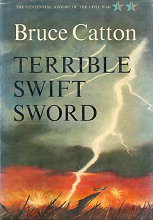
CATTON : Terrible swift sword (fülszöveg)
In TERRIBLE SWIFT SWORD, Bruce Catton tells the story of the Civil War as never before—of two turning points which changed the scope and meaning of the war. First, he describes how the war slowly but steadily got out of control. This would not be the neat, short, "limited" war both sides had envisioned. And then the author reveals how the sweeping force of all-out conflict changed the war's purpose, turning it into a war for human freedom.
It was not initially a war against slavery. Instead, this was, Mr. Lincoln kept insisting, a fight to reunite the United States. At first, it was not even much of a fight. Cautious generals; inexperienced, incompetent, or jealous administrators; shortages of good people and supplies; excesses of both gloom and optimism, kept each side from swinging into decisive action. As the buildup began, there were maddening delays. The earliest engagements were halting and inconclusive. After these first tests at arms, reputations began to crumble. Buell, Halleck, Beauregard, Albert Sidney Johnston, failed to drive ahead—for reasons good and bad. General McClellan (impaled in these pages on the arrogant words of his letters) captured more imaginations than enemies, and continued to accept serious overestimates of Confederate strength while becoming more and more fatally estranged from his own government.
Then, in this beautifully written history, new or changed figures begin to emerge. Men, measured by battle, favored by fortune, stand out. Grant proves himself a fighter. Stonewall Jackson moves his tough troops with devastating speed (though he is mysteriously late for a battle or two). Lee, unimpressive at first, begins to take charge, boldly, while Jefferson Davis and Abraham Lincoln, in strangely similar situations, feel out the role of President, Commander-in-Chief, and the limits of the war itself. Compact wartime biographies of these men are woven through the narrative as strong enduring threads.
This is a book of clashing action, reflective moments, lit by telling details and astonishing in scope. The reader sees the war both on its surface and underneath; in the terrible, swift swords which caused rivers to run red, men and women to cry out; in the tension and cross pressures of the capital cities—Washington, Richmond, London. It moves from early episodes of the war in the west to the vicious battle at Antietam; from Farragut's superbly executed rush on New Orleans to an examination of the astonishing trade between enemies. (Helping your enemy seemed to be essential; though the nation had split, each sector could not apparently survive separately.)
Bruce Catton illuminates the tortured, exciting way to and beyond Emancipation,"the act which enlarged the horizon of those in bondage" and "in the end push(ed) America's own horizon all the way out to infinity."